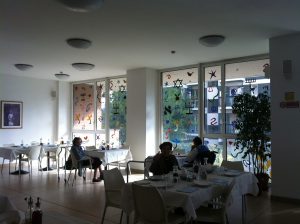NEWS For the Italian Jewish community, coronavirus care starts with the elderly
“Prevention is always essential. It is even more so during this medical emergency, especially for the elderly, who are the most threatened and need to be treated in a timely manner. In several Jewish communities and care homes for the elderly, action was taken immediately and we continue to monitor the situation,” UCEI Vice-President Giorgio Mortara explained in an interview to Pagine Ebraiche.
As a doctor and as UCEI social services manager, Mortara explained that the communities’ caring for the elderly follows two strategies. “On the one hand, the elderly in retirement homes are protected through isolation, so that the risk of infection is minimised. From Milan to Rome, measures to ensure the safety of guests and healthcare workers have been taken. On the other hand, communication must be used to explain to the elderly and their families what is happening, thus looking after the psychological aspect of this very complicated crisis.”
As Mortara highlighted that leaving no one behind is one of our most important goals. This is also the reason why UCEI virtual assistance is essential to provide support to those who need it.
“Our three social workers Miriam Sofia, Giada Maiolini and Giulia Tura, are taking care, remotely of course, of beneficiaries coming from different macro-areas (Northeast, Northwest and Centre-South). It is important for people not to feel abandoned and it is also a way to give security and bring tranquility. Constant telephone communication is an instrument to protect our users. This is why we’re working to provide technical support to those who need it, especially people far from the communities.” Mortara continued, “we do that even just so that these people can keep in touch with our social workers or with community centres, be given the Derasha of the Week, speak with a Rabbi. The idea of a community close to its members is most important.”
UCEI has promoted various activities, from fundraising to phone assistance, fostered in collaboration with AME (Jewish Medical Association), MDA, communities and organisations already active in the area, in order to give psychological support to anyone who needs help.
Beyond the emergency, Mortara pointed out the future need to maintain high standards of prevention among the elderly.
“As the current events have shown us, it is important to act promptly both in the event of an emergency and in normal circumstances. We must carry on with a regular screening of elderly people in order to ensure a high quality of life for them and act immediately in case there is problem. This is a characteristic of an ethical approach medicine which is not only keen on high performance,” he concluded.
Translated by Mattia Stefani and revised by Claudia Azzalini, both students at the Advanced School of Modern Languages for Interpreting and Translation of Trieste University and interns at the newspaper office of the Union of the Italian Jewish Communities.

